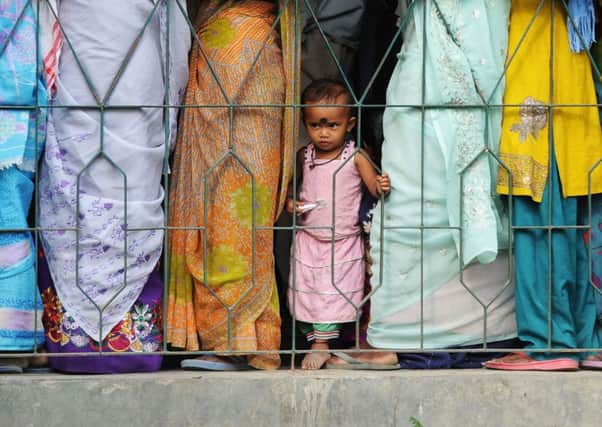India: Polls open in world’s biggest election


With 814 million eligible voters, India will go to the polls in stages over the next five weeks – the staggered approach made necessary by the country’s vast size. Voters will choose representatives for the 543-seat lower house of parliament. Results from all 935,000 polling stations are expected on 16 May.
The right-wing opposition Bharatiya Janata Party and its candidate for prime minister, Narendra Modi, are seen as the biggest threats to the governing centre-left Congress party. BJP is expected to do well but fall short of a 272-seat majority, making a coalition government a likely outcome, observers said.
Advertisement
Hide AdAdvertisement
Hide Ad“I’ve made it a point to vote this time because we want change,” said Rumi Nath, 36, a housewife waiting to vote in the rural town of Lakhimpur on the Brahmaputra River.
“Our area remains backward and underdeveloped 67 years after independence.”
Congress – which has ruled India for much of the six decades since independence – has been led by Prime Minister Dr Manmohan Singh, 81, for the past decade, though the election is being fought by party vice-president Rahul Gandhi, 43.
Congress could face a drubbing due to corruption scandals and recent years of economic slowdown, according to polls.
The BJP’s Mr Modi has been credited with ushering in strong industrial growth in the western state of Gujarat, where he has been chief minister for 11 years.
The election will be key to the future of the family dynasty that has ruled India for much of its post-independence history.
The Nehru-Gandhi family is facing its biggest political threat in over a decade. While Rahul Gandhi has been presented to voters as a youthful leader who can rejuvenate India’s faltering economy, many see him as privileged, aloof and out of touch.
The party has not even formally declared him as its candidate for prime minister, political manoeuvring aimed at protecting him from being scapegoated if the party – and the family – is forced from power.
Advertisement
Hide AdAdvertisement
Hide AdCritics of Mr Modi question whether the Hindu nationalist candidate can be a truly secular leader. They note he has failed to take responsibility or apologise for rioting that left more than 1,000 dead in his state in 2002.
He is accused of doing little to stop the anti-Muslim rampage, though he denies any wrongdoing.
The BJP was the last major party yesterday to release its campaign manifesto, which envisions India’s path towards full development through futuristic infrastructure projects such as high-speed trains, 100 new modern cities and wireless internet facilities in public places.
But such ambitious plans hold little appeal for most voters in rural Assam, where voting took place yesterday in five constituencies as well as in one in neighbouring Tripura state.
Here, people are more concerned about basic needs like guarding against the dangers of flooding, soil erosion and heavy rains washing away homes, or building more roads and bridges to connect far-away towns and villages to the main cities.
“As monsoon sets in, we get worried about daily meals,” said Pulok Nath, a voter in Lakhimpur. “We’ve been living on a mud embankment for years after floods washed away our home and a large part of our village.”
Assam’s highest elected official, chief minister Tarun Gogoi of Congress, said he was confident of winning re-election.
“There is no Narendra Modi magic in Assam. The Congress has been winning every form of elections since 2001 in Assam, and we are going to repeat the performance this time,” he said.
With more than 65 per cent of India’s 1.2 billion people under 35, young voters will have a strong impact on the election.